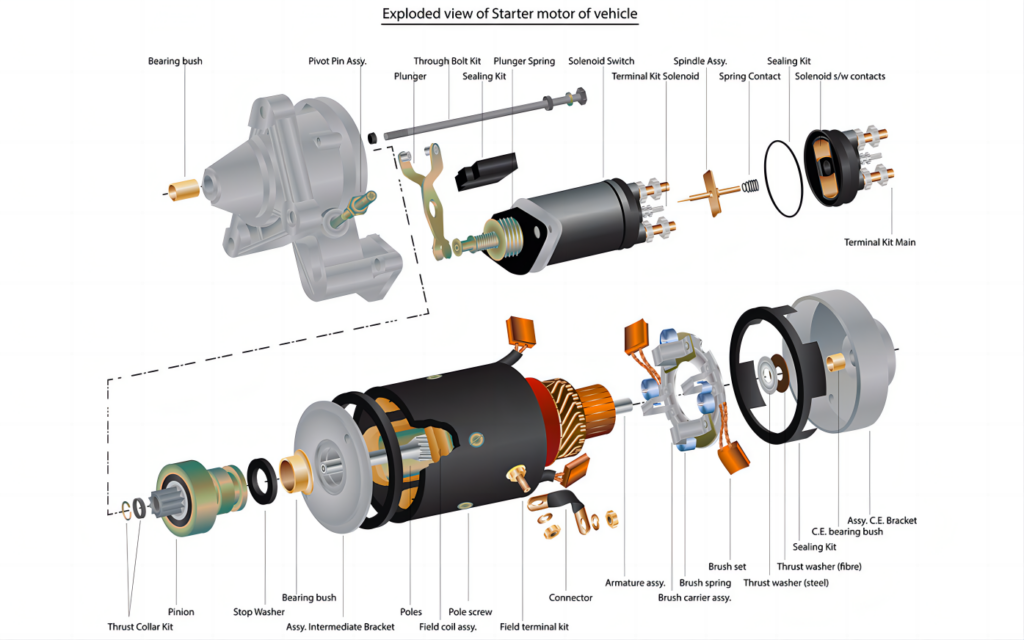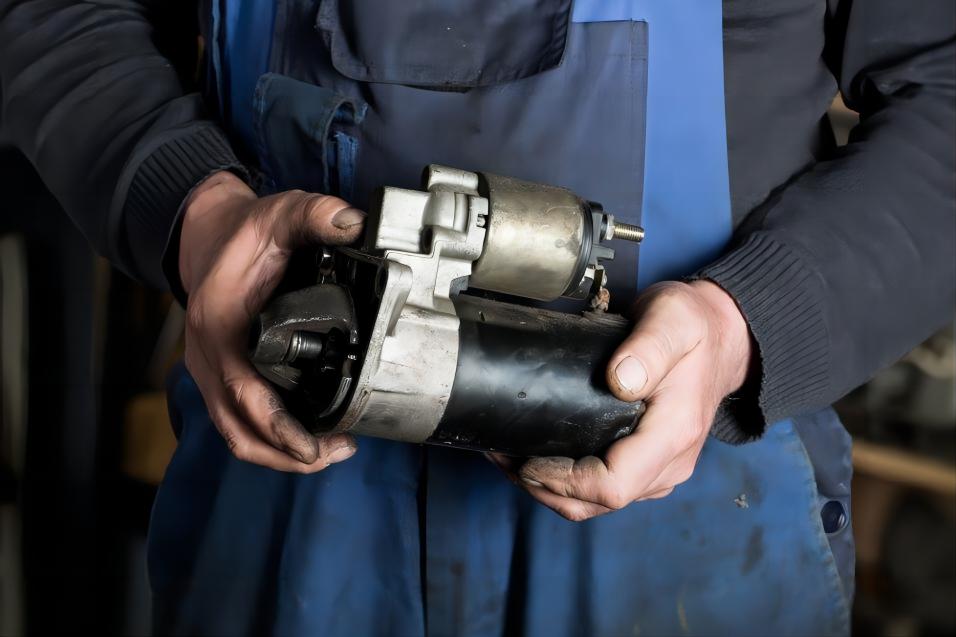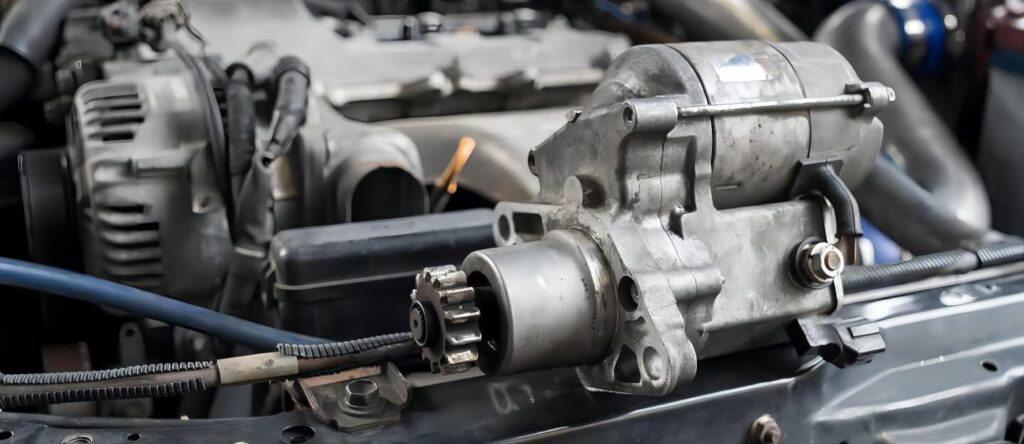7/15/2024
Introduction to the Engine Starter Motor
The engine starter motor is a crucial component in the automotive engine starting system.
It is responsible for initiating the engine from a standstill to a state where it can operate autonomously.
Typically driven by an electric motor, the starter motor converts electrical energy into mechanical energy to provide the necessary torque and speed for the engine to start.
The starter motor plays a pivotal role in vehicle operation, ensuring reliable engine starts under various conditions.
Starting a motor generates a substantial amount of electricity. When dealing with so much power, it’s important to have a backup solution to prevent damage and ensure safety at all times.

The starter motor consists of several key components that work together to achieve the starting function:
1. Motor: The core component that provides power, converting electrical energy into mechanical energy.
2. Reducer: Converts the high-speed rotation of the motor into low-speed, high-torque rotation.
3. Gear system: Includes the starter gear and flywheel gear, which are used to transmit rotational force.
4. Electromagnetic switch: Controls the start and stop of the starter motor to ensure that current flows into the starter motor when needed.
5. Bearings and brushes: Support rotating parts and provide current paths to ensure stable operation of the motor.
Classification of Starter Motor:
DC Motor Starter Motor: This is the most common type of starter motor, using direct current to drive the motor. It is widely used in various cars and light trucks.
AC Motor Starter Motor: This type of starter motor is less common and is mainly used in specialized applications, such as in large machinery.
Gear-Reduction Starter Motor: Uses a gear reduction mechanism to provide additional starting torque. It is used in heavy-duty vehicles or high-performance cars requiring high starting torque.
Brushless Motor Starter Motor: A newer technology that reduces wear on components, offering longer service life and higher efficiency.
Performance of the Engine Starter Motor:
1. Torque Output: The starter motor requires sufficient torque to overcome the engine’s inertia and quickly start it.
2. Starting Speed: The starter motor needs to bring the engine to a high enough speed within a short period so that the engine can operate on its own.
3. Reliability: The starter motor must be highly reliable, capable of functioning normally under various conditions such as cold starts or after prolonged periods of parking.
4. Durability: Since the starter motor undergoes frequent use, it must be designed to withstand long-term operation without easy damage.
These performance characteristics directly influence the starter motor’s performance and reliability in practical use.

When the Starter Motor is Bad, Common Signs of a Bad Starter Motor:
- No Cranking Noise: When you turn the key, the engine should crank. If you hear a clicking sound but the engine doesn’t turn over, it could indicate a bad starter motor.
- Grinding Noise: A grinding noise when starting the car may suggest a problem with the starter gear not engaging properly. This can lead to damage to both the starter and flywheel.
- Freewheeling: Freewheeling occurs when you hear a whirring noise without any attempt from the engine to crank. This could signal a bad starter motor or a damaged starter solenoid.
- Diagnosing The Starter Motor: Diagnosing a bad starter motor requires a systematic approach, ruling out other potential issues like a dead battery, bad relay, or blown fuse.
- Oil Contamination: Oil contamination on the starter motor could occur if there is an engine oil leak or the starter motor is positioned in a vulnerable location.
- By understanding the distinctive signs of each problem, you can narrow down the possibilities and address the underlying issue efficiently. These 4 diagnostic steps will help you identify if the starter motor is actually bad or not.
Starter Motor Maintenance is a Crucial Part:
1.Cleaning: Regularly clean the starter motor’s surface to reduce dirt and rust accumulation.
2.Applying Grease: Apply grease to the starter motor bolts and connections to prevent rust.
3.Wear: Inspect the starter gear for signs of excessive wear. Worn gears can lead to difficult starts or unusual noises.
4.Activation: When the starter motor is in operation, check if the solenoid switches on swiftly and releases correctly after the engine starts.
5.Engine Antifreeze: Use additional starting fluid in cold weather to help the starter motor perform effectively at low temperatures.
6.Cooldown Period: If the start fails, wait long enough for the starter motor and battery to cool down, to prevent overheating.
7.Regular Inspections: Regularly take for starter motor checks and maintenance.
8.Part Replacement: If the starter motor malfunctions, replace the faulty part or the entire starter motor.
By following these maintenance measures, you can extend the lifespan of your starter motor and ensure a quick and safe start when needed.

Q&A session
- How often should the engine starter motor be replaced?
- The engine starter motor generally does not need to be replaced regularly, as it is designed for long-term use. However, if you notice any issues with the starter motor, such as slower starting speeds or unusual noises, it may need to be checked or replaced. Normally, it’s a good idea to regularly inspect the starting system’s condition to ensure it can reliably start the engine when needed.
Replacement Starter Motor
Due to advancements in start/stop technology, starter motors endure greater operational stress than ever before, making starter motor issues difficult, if not impossible, to avoid.
If you need to replace your starter motor, look no further. We are one of China’s largest suppliers offering high-quality, low-cost starter motors suitable for nearly all brands and models of industrial equipment.
Visit our online parts store to find the starter motor you need today at a lower price! Standard features include fast delivery and reliable warranty.
